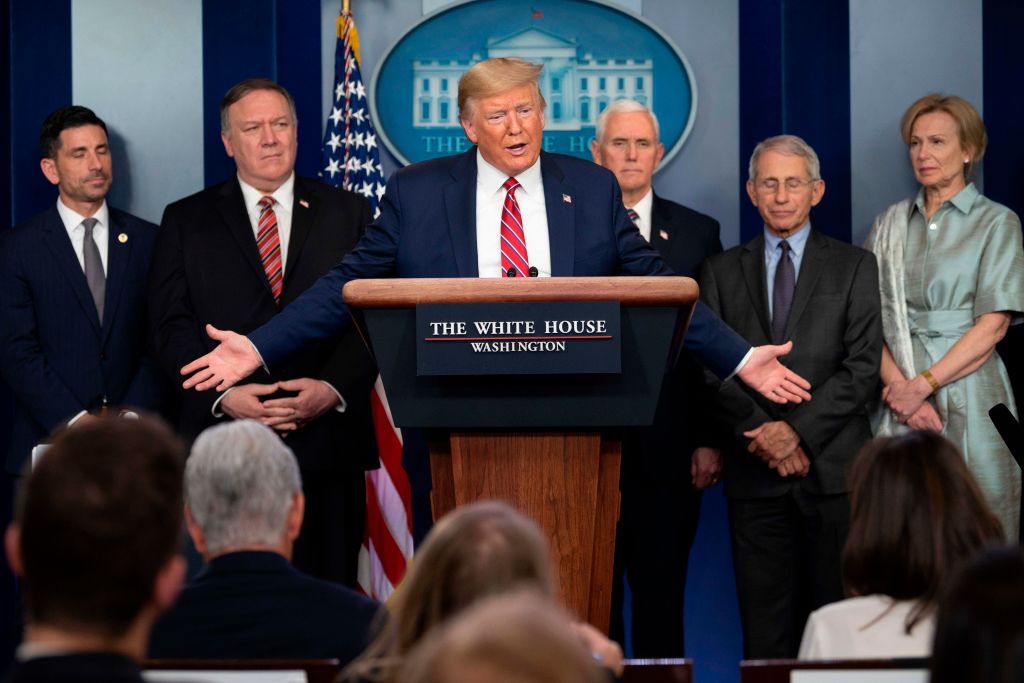Donald Trump is right now facing easily the biggest test of his presidency. That’s a crazy thought considering Trump was impeached just three months ago, spent his first two-plus years in office battling claims his campaign colluded with Russia, and faced allegations of campaign finance violations that included paying hush money to a porn star. But the pandemic caused by the novel coronavirus is totally out of Trump’s wheelhouse. He’s not fighting against a political opponent, the media, or the courts; instead, as the president pointed out on Twitter, he is battling an ‘invisible enemy’ — an unpredictable and deadly illness that’s quickly spread across the globe.
It’s the kind of thing that would normally destroy a presidency — indeed pundits everywhere have been quick to say that Trump’s re-election chances are now wrecked. But if the Trump era has taught us anything it is that conventional political wisdom is always wrong. The truth often turns out to be the precise opposite of what the talking heads are saying. In a few weeks, we might realize that Trump has once again snatched victory from the jaws of defeat.
In just one week, the American public has flipped its opinion on the Trump administration’s response to the virus: 43 percent approved and 54 percent disapproved of Trump’s response last week — this week, 55 percent approve and just 43 percent disapprove. Critics widely panned Trump’s initial response to news that the virus was making its way to the US, saying that his attitude was too cavalier while simultaneously suggesting he was xenophobic for restricting travel from China. Media outlets spread the false claim that he referred to the virus as a ‘hoax’. The administration seemed ill-prepared to ensure hospitals had enough testing kits in the early stages of the crisis. But public opinion changes rapidly, and the December soundbites latched onto by pundits and politicians become less important to Americans as the Coronavirus Task Force, including the sharp and sober Dr Anthony Fauci and Amb. Deborah Birx, gives informative daily briefings.
Trump, meanwhile, is quickly ramping up the federal response. He declared a national emergency one week ago, clearing up $50 billion in federal resources to fight the virus, tightened travel restrictions, closed the southern and northern US borders, lifted key regulations to allow telehealth and expanded testing, and delayed the deadline for filing taxes. He signed the Families First Coronavirus Response Act passed by Congress, which offers free testing, paid sick leave, and expands unemployment benefits. The next piece of proposed legislation would offer direct payments to individuals and families making under a certain income amount.
It’s bizarre to see the same people warning that Trump would operate an authoritarian regime now complaining that he isn’t being authoritarian enough. In addition to the robust federal response we’ve seen thus far, the president has been working on partnerships with private companies, whether that means having Google’s parent company develop a national website for coronavirus screenings or using Walmart parking lots for drive-through testing.
Perhaps the biggest threat to Trump’s re-election is the economic devastation facing millions of Americans as a result of the societal shutdown. The Trump campaign has long planned on running on the economy — it’s his biggest accomplishment, is wholly nonpartisan, and could play a big role in convincing undecided voters. In just a couple of weeks, the stock market gains under Trump have been erased. Experts expect the unemployment rate to jump as high as six percent and for the economy to shed millions of jobs over the next several months. That being said, many economists predicted a recession wasn’t far off to begin with. A global pandemic may be the one justifiable reason people wouldn’t blame Trump for an economic crash. Americans will be thinking about who can guide the economy back on track after the coronavirus threat has diminished — certainly Trump has a good track record. And how much more disastrous would the losses be if the fundamentals of the economy weren’t already so strong?
On the national security front, the coronavirus proved Trump was correct to warn that China was taking advantage of the rest of the world in its dream to become a global hegemon. By all accounts, China initially tried to cover up just how bad the coronavirus outbreak was, delaying countries from preparing properly for months and possibly costing millions of lives. When called out for this behavior, China attempted to rewrite history with communist propaganda, insisting that the US Army was the origin of COVID-19 and that Trump was ‘racist’ for criticizing them. Trump’s trade war, meanwhile, was intended to diminish US independence on the Chinese economy, a wise move in retrospect considering the virus thrashed the Chinese supply chain, threatening numerous American industries. The impact on the healthcare sector was particularly concerning, as Americans rely heavily on Chinese-produced antibiotics and medical supplies. The approach to China under the Trump administration stands in stark contrast to his opponent, Joe Biden, who notably kicked off his presidential campaign last year by mocking the idea that China would ‘eat our lunch’.
If the threat posed by the coronavirus has decreased and American life has returned relatively to normal by the election, Trump will be credited with leading the country through one of its toughest moments in recent history. If not, Trump has the benefit of being a ‘wartime president’ — a distinction that has carried American presidents to re-election even amid turbulent economies, mainly because people tend to be wary of changing leadership in times of crisis. Either way, November looks good for Trump.


















